| Listing 1 - 10 of 27 | << page >> |
Sort by
|
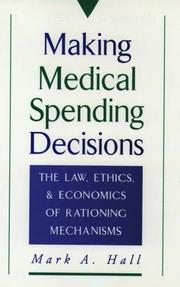
ISBN: 0195092198 Year: 1997 Publisher: New York Oxford university press
Abstract | Keywords | Export | Availability | Bookmark
 Loading...
Loading...Choose an application
- Reference Manager
- EndNote
- RefWorks (Direct export to RefWorks)
Health care rationing --- gezondheidseconomie (gezondheidszorgeconomie) --- économie de la santé (économie des soins de santé) --- Health resources rationing --- Medical care rationing --- Rationing of health care --- Rationing of medical care --- Medical economics --- Medical policy --- Rationing
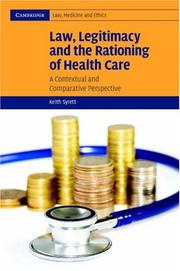
ISBN: 1107177235 1281243345 9786611243340 0511377916 0511495382 0511377002 0511376065 0511374569 0511378807 0521857732 052167445X Year: 2007 Publisher: Cambridge : Cambridge University Press,
Abstract | Keywords | Export | Availability | Bookmark
 Loading...
Loading...Choose an application
- Reference Manager
- EndNote
- RefWorks (Direct export to RefWorks)
Dr Keith Syrett argues for a reappraisal of the role of public law adjudication in questions of healthcare rationing. As governments worldwide turn to explicit rationing strategies to manage the mismatch between demand for and supply of health services and treatments, disappointed patients and the public have sought to contest the moral authority of bodies making rationing decisions. This has led to the growing involvement of law in this field of public policy. The author argues that, rather than bemoaning this development, those working within the health policy community should recognise the points of confluence between the principles and purposes of public law and the proposals which have been made to address rationing's 'legitimacy problem'. Drawing upon jurisprudence from England, Canada and South Africa, the book evaluates the capacity of courts to establish the conditions for a process of public deliberation from which legitimacy for healthcare rationing may be derived.
Health care rationing --- Health resources rationing --- Medical care rationing --- Rationing of health care --- Rationing of medical care --- Medical economics --- Medical policy --- Rationing --- Medical laws and legislation --- Law and legislation. --- Government policy. --- Moral and ethical aspects. --- Law --- General and Others
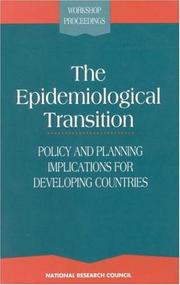
ISBN: 0309048397 9786610196623 1280196629 0309590655 0585273146 9780585273143 9780309048392 0309048307 Year: 1993 Publisher: Washington, D.C. National Academy Press
Abstract | Keywords | Export | Availability | Bookmark
 Loading...
Loading...Choose an application
- Reference Manager
- EndNote
- RefWorks (Direct export to RefWorks)
Electronic books. -- local. --- Epidemiology -- Developing countries -- Congresses. --- Health care rationing -- Developing countries -- Congresses. --- Health planning -- Developing countries -- Congresses. --- Epidemiology --- Health care rationing --- Health planning --- Comprehensive health planning --- Health care planning --- Health services planning --- Medical care --- Medical care planning --- Public health --- Health resources rationing --- Medical care rationing --- Rationing of health care --- Rationing of medical care --- Planning --- Medical policy --- Health services administration --- Medical economics --- Rationing --- Diseases
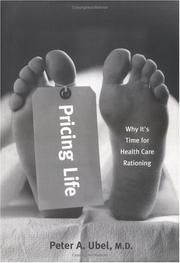
ISBN: 0262210169 0262710099 058520974X 9780585209746 9780262285346 0262285347 Year: 1999 Publisher: Cambridge, MA : MIT Press,
Abstract | Keywords | Export | Availability | Bookmark
 Loading...
Loading...Choose an application
- Reference Manager
- EndNote
- RefWorks (Direct export to RefWorks)
"Ubel has made important contributions to our understanding of how people make choices about health care and of the factors that enter into these decisions." - Wallace F. Berman, M.D., New England Journal of Medicine.
Health care rationing --- Medical care --- Soins médicaux --- Cost effectiveness --- Rationnement --- Coût-efficacité --- Health care rationing. --- kosteneffectiviteit (kosten-en-batenanalyse) --- analyse coût-bénéfice --- Cost effectiveness. --- gezondheidseconomie (gezondheidszorgeconomie) --- gezondheidszorg --- Health resources rationing --- Medical care rationing --- Rationing of health care --- Rationing of medical care --- économie de la santé (économie des soins de santé) --- soins de santé --- Medical economics --- Medical policy --- Rationing
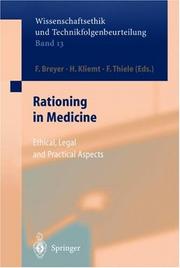
ISBN: 3540427821 Year: 2002 Publisher: Berlin Springer
Abstract | Keywords | Export | Availability | Bookmark
 Loading...
Loading...Choose an application
- Reference Manager
- EndNote
- RefWorks (Direct export to RefWorks)
Ethics, Medical --- Health Care Costs --- Health Care Rationing --- Health Policy --- Medical Policy --- Medical care, Cost of --- Medical ethics --- National Health Programs --- Economic aspects --- Law and legislation --- Moral and ethical aspects --- Economics --- Legislation & jurisprudence --- Health resources rationing --- Medical care rationing --- Rationing of health care --- Rationing of medical care --- Medical economics --- Medical policy --- Rationing --- Conferences - Meetings
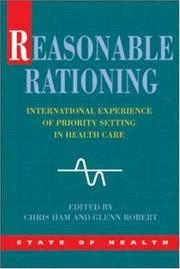
ISBN: 1280953942 9786610953943 0335225675 9780335225675 9780335211869 0335211860 9780335211852 0335211852 9781280953941 6610953945 Year: 2003 Publisher: Maidenhead Open university press
Abstract | Keywords | Export | Availability | Bookmark
 Loading...
Loading...Choose an application
- Reference Manager
- EndNote
- RefWorks (Direct export to RefWorks)
''Reasonable Rationing is must reading for those interested in how to connect theory about fair rationing processes to country-level practices. The five case studies reveal a deep tension between political pressures to accommodate interest group demands and ethically motivated efforts to improve both information and institutional procedures for setting fair limits to care. The authors frame the issues insightfully.''. - Professor Norman Daniels, Harvard School of Public Health. . How are different countries setting priorities for health care?. . What role does information and evidence on cost a
Health care rationing --- Medical policy --- Health planning --- Health resources rationing --- Medical care rationing --- Rationing of health care --- Rationing of medical care --- Medical economics --- Rationing --- #SBIB:033.AANKOOP --- #SBIB:316.334.3M50 --- #SBIB:35H436 --- Organisatie van de gezondheidszorg: algemeen, beleid --- Beleidssectoren: welzijn, volksgezondheid en cultuur
Book
ISBN: 0262320762 9780262320764 1306957877 9781306957878 9780262027496 0262027496 0262320770 Year: 2014 Publisher: Cambridge, Massachusetts : The MIT Press,
Abstract | Keywords | Export | Availability | Bookmark
 Loading...
Loading...Choose an application
- Reference Manager
- EndNote
- RefWorks (Direct export to RefWorks)
"Most people would agree that the healthcare system in the United States is a mess. Healthcare accounts for a larger percentage of gross domestic product in the United States than in any other industrialized nation, but health outcomes do not reflect this enormous investment. In this book, Philip Rosoff offers a provocative proposal for providing quality healthcare to all Americans and controlling the out-of-control costs that threaten the economy. He argues that rationing--often associated in the public's mind with such negatives as unplugging ventilators, death panels, and socialized medicine--is not a dirty word. A comprehensive, centralized, and fair system of rationing is the best way to distribute the benefits of modern medicine equitably while achieving significant cost savings. Rosoff points out that certain forms of rationing already exist when resources are scarce and demand high: the organ transplant system, for example, and the distribution of drugs during a shortage. He argues that if we incorporate certain key features from these systems, healthcare rationing would be fair--and acceptable politically. Rosoff considers such topics as fairness, decisions about which benefits should be subject to rationing, and whether to compensate those who are denied scarce resources. Finally, he offers a detailed discussion of what an effective and equitable healthcare rationing system would look like."--Provided by publisher.
Health care rationing. --- Medical economics. --- PHILOSOPHY/Ethics & Bioethics --- BIOMEDICAL SCIENCES/General --- Economics, Medical --- Health --- Health economics --- Hygiene --- Medical care --- Medicine --- Health resources rationing --- Medical care rationing --- Rationing of health care --- Rationing of medical care --- Medical economics --- Medical policy --- Rationing --- Economic aspects
Book
ISBN: 019169892X 9780191698927 Year: 2005 Publisher: Oxford : Oxford University Press,
Abstract | Keywords | Export | Availability | Bookmark
 Loading...
Loading...Choose an application
- Reference Manager
- EndNote
- RefWorks (Direct export to RefWorks)
This new edition appraises the effects of a change in government, the Bristol Inquiry, the Shipman enquiry, and rising discontent with NHS funding, all of which have prompted radical changes to the funding and management of the NHS in recent years.
Health care rationing --- National health services --- Medical care --- Law and legislation --- Delivery of health care --- Delivery of medical care --- Health care --- Health care delivery --- Health services --- Healthcare --- Medical and health care industry --- Medical services --- Personal health services --- Public health --- Medicine, State --- National Health Service (Great Britain) --- Health resources rationing --- Medical care rationing --- Rationing of health care --- Rationing of medical care --- Medical economics --- Medical policy --- Rationing
Book
ISBN: 1282543822 9786612543821 0199722897 9780199722891 9780195128048 0195128044 0197707424 Year: 2009 Publisher: Oxford New York Oxford University Press
Abstract | Keywords | Export | Availability | Bookmark
 Loading...
Loading...Choose an application
- Reference Manager
- EndNote
- RefWorks (Direct export to RefWorks)
Leonard Fleck reflects on the central moral and political challenges of health reform today. The core argument of this book is that no one has a moral right to impose rationing decisions on others if they are unwilling to impose those same rationing decisions on themselves in the same medical circumstances.
Health care rationing --- Public health --- Health services accessibility --- Right to health --- Health care reform --- Social justice --- Community health --- Health services --- Hygiene, Public --- Hygiene, Social --- Public health services --- Public hygiene --- Social hygiene --- Health --- Human services --- Biosecurity --- Health literacy --- Medicine, Preventive --- National health services --- Sanitation --- Health resources rationing --- Medical care rationing --- Rationing of health care --- Rationing of medical care --- Medical economics --- Medical policy --- Rationing --- Moral and ethical aspects --- Democracy --- Health Care Rationing --- Health Care Reform --- Health Priorities --- Healthcare Disparities --- Insurance, Health --- Right to health care
Book
ISBN: 3319211110 3319211129 Year: 2016 Publisher: Cham : Springer International Publishing : Imprint: Springer,
Abstract | Keywords | Export | Availability | Bookmark
 Loading...
Loading...Choose an application
- Reference Manager
- EndNote
- RefWorks (Direct export to RefWorks)
The gap between a rising demand for health care services on the one side and scarce resources on the other, is leading to a growing pressure on decision-making processes. Hence, prioritization in medicine has become an increasingly important issue for assuring stability of health systems and improving the capability of health care. The present volume addresses normative dimensions of methodological and theoretical approaches, the legal basis behind priority setting as well as international experiences concerning the normative framework and the process of priority setting. It also examines specific criteria for prioritization and discusses economic evaluations. Contributing authors from a broad range of scientific disciplines discuss prioritization within an international dialogue.
Public Health - General --- Public Health --- Health & Biological Sciences --- Health care rationing --- Health services accessibility --- Access to health care --- Accessibility of health services --- Availability of health services --- Medical care --- Health resources rationing --- Medical care rationing --- Rationing of health care --- Rationing of medical care --- Access --- Medical economics --- Medical policy --- Rationing --- Practice of medicine. --- Health Administration. --- Practice and Hospital Management. --- Medical practice --- Practice of medicine --- Physician practice acquisitions --- Health administration. --- Public health administration. --- Health administration --- Health care administration --- Health sciences administration --- Public health --- Health services administration --- Administration
| Listing 1 - 10 of 27 | << page >> |
Sort by
|

 Search
Search Feedback
Feedback About UniCat
About UniCat  Help
Help News
News